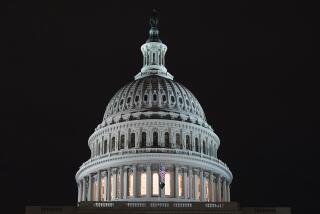EU Summit OKs Pact on Fairer Funding
- Share via
BERLIN — After all-night talks and emotional battles, leaders of the 15 European Union states endorsed an accord just after sunrise today that outlines a spending plan for the next seven years and eases the outsize burdens long carried by the group’s richer countries.
The agreement reached after nearly 20 straight hours of negotiations was a triumph for German Chancellor Gerhard Schroeder, who has made a more equitable distribution of EU costs a cornerstone of his current presidency of the world’s biggest economic bloc.
“Everyone here was desperate for an agreement,” one British diplomat noted in explaining why angry holdouts France and Spain eventually caved in with the light of dawn and the outbreak of bird song.
“I’m very proud we have been able to put this together,” an exhausted but relieved Schroeder told journalists shortly after announcing that the agreement had been reached. “It was important that we blend budget discipline on one hand and social justice on the other.”
He said Germany’s $12-billion net contribution to EU coffers would be reduced slightly by the agreement, but that “we haven’t exactly won the lottery.”
Failure to agree on more efficient EU spending would probably have exposed the new 11-country common currency, the euro, to heavy losses against the strong U.S. dollar and weakened the economies of many of the member states.
The savings for Germany and the other contributors to the union’s $92-billion annual budget that pay in more than they get back in programs and services--Austria, Sweden and the Netherlands--were more symbolic than the deep cuts each had sought after shouldering much of the financial load for the alliance.
But against a backdrop of deteriorating security on the Continent as the North Atlantic Treaty Organization waged a military campaign against recalcitrant Yugoslavia, a financing deal was essential for the EU leaders afflicted by legendary indecisiveness, infighting and a recent scandal over corruption and mismanagement in the union’s Brussels-based bureaucracy.
Most important for the German government, which is by far the EU’s biggest net contributor, was an agreement to limit farm subsidies to $44 billion on average in each of the years from 2000 to 2006. Subsidies to compensate farmers for lower world prices for their produce eat up half the annual budget and have tended to prop up inefficient farms, blunting incentive for improvement.
Reform of the EU’s Common Agricultural Program is considered a prerequisite to admitting new member states, especially because the most promising candidates, such as Poland and Hungary, have sizable agricultural sectors and would considerably boost the subsidy budget.
Some of the more intractable aspects of the subsidy debate were delayed for future resolution--a move that allowed a general agreement to emerge from the special, two-day summit.
Even with postponement of detailed programs for grain and milk price supports, the financing deal met with fierce resistance, particularly by the Spanish government, which could lose billions in “cohesion funds” it has been getting to keep its economy in shape for participation in the euro currency introduced at the start of this year.
French President Jacques Chirac, irked by Britain’s success in retaining a $3-billion annual rebate finagled by then-Prime Minister Margaret Thatcher 14 years ago, also opposed the new financing plan until the other leaders agreed to delay the most contentious agricultural issues by as long as four years.
France is the biggest beneficiary of the EU’s agricultural spending, with more than a million farmers drawing payments from the common market coffers. Chirac had bitterly fought Schroeder’s earlier proposal to have each recipient country pay a share of its subsidy budget--aimed at encouraging more efficiency.
The French president was pleased that his plea for overall spending restraint was heeded and the farm budget spared plundering to finance development of the poorer countries in the alliance.
British and German diplomats were most pleased by the agreement, which, for the first time in alliance history, embraces the wealthier nations’ calls for belt-tightening by charging the net contributors less and reducing outlays to the recipients.
More to Read
Sign up for Essential California
The most important California stories and recommendations in your inbox every morning.
You may occasionally receive promotional content from the Los Angeles Times.














